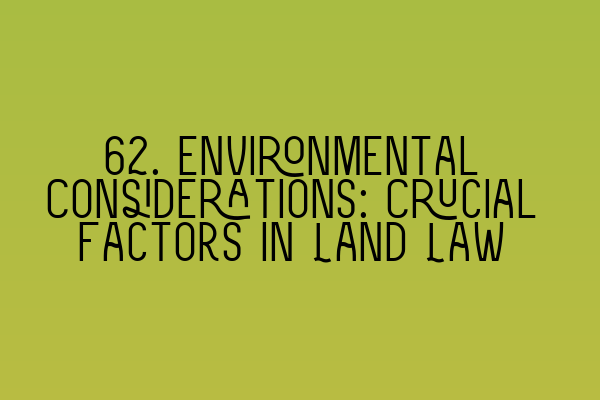Environmental Considerations: Crucial Factors in Land Law
When it comes to land law, there are many important factors to consider, and one of the most crucial of these is the impact on the environment. With increasing concerns about climate change and sustainability, it is imperative for property law practitioners to have a thorough understanding of the environmental considerations that can arise in various land law matters. In this blog post, we will explore the significance of environmental considerations in land law and highlight their importance in legal practice.
1. Environmental Legislation and Regulations
Environmental legislation and regulations play a significant role in the use and development of land. These laws are designed to protect the environment, promote sustainable practices, and mitigate potential risks to human health and the ecosystem. As a property law practitioner, it is essential to be well-versed in the relevant environmental legislation and regulations to ensure compliance and provide the best possible advice to clients.
2. Impact Assessments
One of the key aspects of environmental considerations in land law is the requirement for environmental impact assessments. These assessments are conducted to evaluate the potential environmental effects of a proposed development or land use activity. They help identify any potential risks or adverse effects on the environment, such as pollution, habitat destruction, or biodiversity loss. By conducting thorough impact assessments, property law practitioners can ensure that their clients are aware of the environmental implications of their actions and take appropriate measures to minimize any negative effects.
3. Planning and Development
Environmental considerations also play a crucial role in the planning and development process. Local planning authorities take into account various environmental factors when considering planning applications. These factors may include the impact on natural habitats, air quality, noise pollution, and the overall environmental sustainability of the proposed development. Property law practitioners can support clients by advising on the environmental aspects of planning applications, ensuring compliance with environmental regulations, and navigating any environmental objections raised during the planning process.
4. Contamination and Remediation
Contamination of land is a significant environmental concern in land law. It can arise from historical industrial activities, improper waste disposal, or accidental spills. Property transactions involving contaminated land require careful consideration and assessment of potential liabilities and responsibilities. Property law practitioners must be able to identify potential contamination issues, advise on appropriate investigations and assessments, and negotiate remediation measures to address the contamination effectively.
5. Conservation Areas and Protected Land
Conservation areas and protected land are areas of particular ecological, historical, or cultural significance. They are subject to specific protections and regulations to ensure their preservation and prevent any adverse impact from development or land use activities. Property law practitioners need to be familiar with the legislation governing conservation areas and protected land to advise clients on any restrictions or obligations that may apply when dealing with properties in these areas.
In conclusion, environmental considerations are crucial factors in land law. As a property law practitioner, it is essential to have a comprehensive understanding of the environmental legislation and regulations, conduct thorough impact assessments, advise on planning and development matters, address contamination issues, and navigate the complexities of conservation areas and protected land. By integrating environmental considerations into legal practice, we can ensure sustainable and responsible land use while protecting the environment for future generations.
For further information and preparation for the SQE exams, you can explore the following resources:
– SQE 1 Practice Exam Questions
– SQE 1 Practice Mocks FLK1 FLK2
– SQE 2 Preparation Courses
– SQE 1 Preparation Courses
– SRA SQE Exam Dates
Remember, environmental considerations are not just important for legal practice but for the well-being of our planet. Let us strive to be environmentally conscious and ensure sustainable practices in land law.
